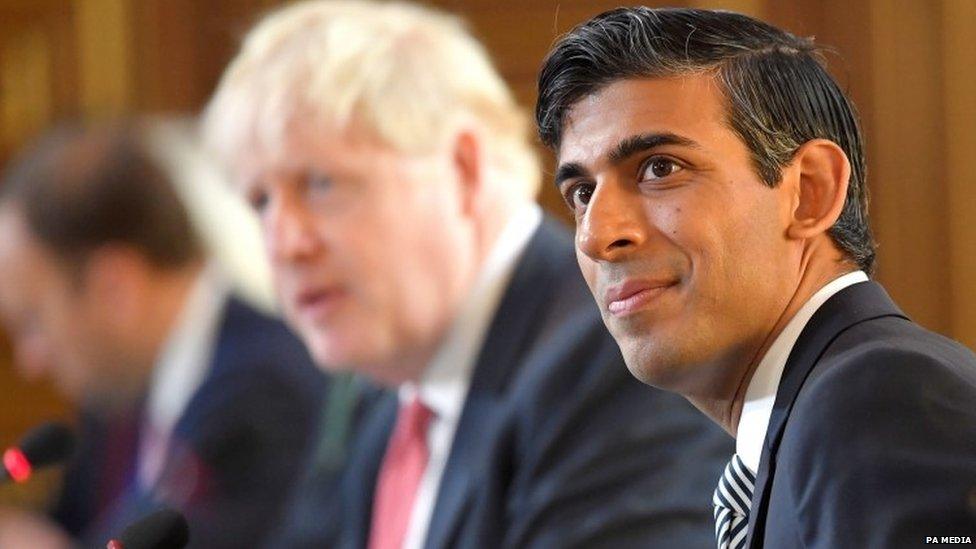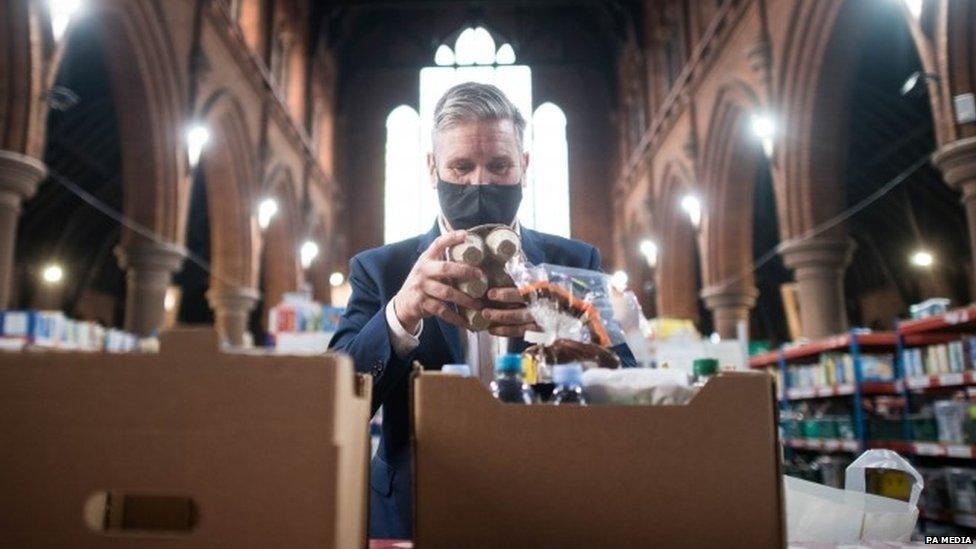Universal credit: All options on the table for PM and Sunak
- Published

Remember at the start of the pandemic the prime minister and the chancellor said they would "put their arms around" everyone at a time of genuine emergency.
Even then it was a political promise that seemed unlikely to be kept.
But as the health nightmare of Covid-19 unfolded, the country's doors closed and the economy took a thumping, ministers presided over a massive and very expensive expansion of the state.
That included raising the amount of universal credit, the benefit that's paid to about six million people on low incomes or out of work, by £20 a week.
With the basic level of the benefit starting at about £340 a month for single people under 25, that money has made a real difference.
As one recipient, Carl Hackshaw from Croydon, told me on Monday, that increase meant that he's gone from "having to go without to having barely enough".
The looming political problem for the government is that the £20 top-up is due to stop at the end of March.
It was originally intended as an emergency extra while the economy was largely shuttered and work was drying up.
But the dramatic first days of the pandemic have morphed into a crisis we've been living with for months and months.
We are back in lockdown and even if, as ministers hope, nationwide restrictions start to be rolled back by spring, the economy simply won't have bounced back by then.
And job losses often take time to filter through, so the number of people losing work, or having their hours cut is sadly, likely still to go up for months to come.
No surprise then, there are dozens of Tory MPs who are - as one of them described it - "deeply, deeply uneasy", about taking the weekly £20 payment away.
Labour, sensing the government's discomfort, and concerned about the impact the change would have on millions of households, have called their own vote on the topic on Monday night.
They're using what's known as an "opposition day debate".
Votes in those kinds of debates don't routinely have the power to force governments to change policy although they have occasionally done so in the past, most notably on rights for Ghurkas during one chaotic day in 2009.
But they certainly have the power to embarrass, particularly when they know MPs on the government's own side are unhappy with the policy too.
That is certainly the case this time. Campaigning Tory MPs like Robert Halfon, the chair of the Commons education select committee, and the former work and pensions secretary, Stephen Crabb, believe it's just not the right time to take cash away from families who are under financial pressure at the moment.
The increasingly noisy Northern Research Group of Tory MPs, with constituencies outside traditional Tory territory in the South East of England, are publicly calling for an extension to the payments for as long as Covid-19 restrictions are in place.
And the cabinet minister with responsibility for benefits, Therese Coffey, is also understood to be pushing for the PM and the Treasury to change tack, and cancel what would feel like a cut in income.
The trio discussed the options at a meeting on Friday.
The occupant of 11 Downing Street, though, is very reluctant to keep signing enormous cheques. To make the rise permanent would have a huge price tag - a government source suggested it would cost about £6bn a year.

Even though the government has spent and borrowed record breaking amounts of cash, for some context, adding 1p to income tax doesn't even raise enough to pay for that increase for ever.
The chancellor is said to be "fighting exceptionally hard" against it carrying on.
As the decision comes closer, however, the politics are making it harder for the Downing Street neighbours to resist. One senior figure pushing to preserve the payment for now says "we have come a long way since there was no chance - the prime minister's heart would be to extend".
Officially, Downing Street says the matter will be sorted out in due course, notably rather different from just saying the payments will come to an end as planned.
Treasury sources say "all options remain on the table and no decisions have been made yet". But discussions seem to be moving towards a compromise, rather than a straightforward cut.
The £20 payment could just be extended for as long as Covid restrictions are in place. It could stay in place until the autumn, when the government will have to take another look at the public finances, or perhaps, as some MPs are suggesting, it could apply for another year.
Although in theory, another extension creates another cliff-edge moment that is difficult to unravel.
So the idea of a one-off payment to universal credit recipients of £500 or even £1,000 has also been mooted, rather than commit to a permanent additional cost. But that has attracted lots of criticism too.
So there is also the possibility of tweaking one part of the payment. People who receive the benefit sometimes get extra so called "elements", if they have children or need help with paying their rent for example.
Changing the levels of those extra payments for some groups who receive UC might be part of the solution, if Downing Street in the end is adamant the £20 extra has to go.
The government will avoid the spectacle of lots of Tory MPs voting against its position by telling them to abstain.
But it won't make the issue disappear, not just because not all of its MPs will obey the instruction, but because the wider political pressure not to remove the payment is building.
And as time ticks towards a year since the Covid-19 emergency first hit us, ministers are discovering that even contemplating removing support that was put in place in a rush is extremely difficult to do.
As one Cabinet minister suggested "the longer we do it, the harder it is to take away".
The Covid crisis is certain to have many lasting effects, in many ways.
PS. As for Labour, Sir Keir Starmer will not be arguing for the £20 top-up to be kept permanently. Indeed, the opposition has said in the long term it would get rid of Universal Credit. But there is no question the opposition thinks the government is vulnerable on this right now, and will do what they can to push for a change of heart.
